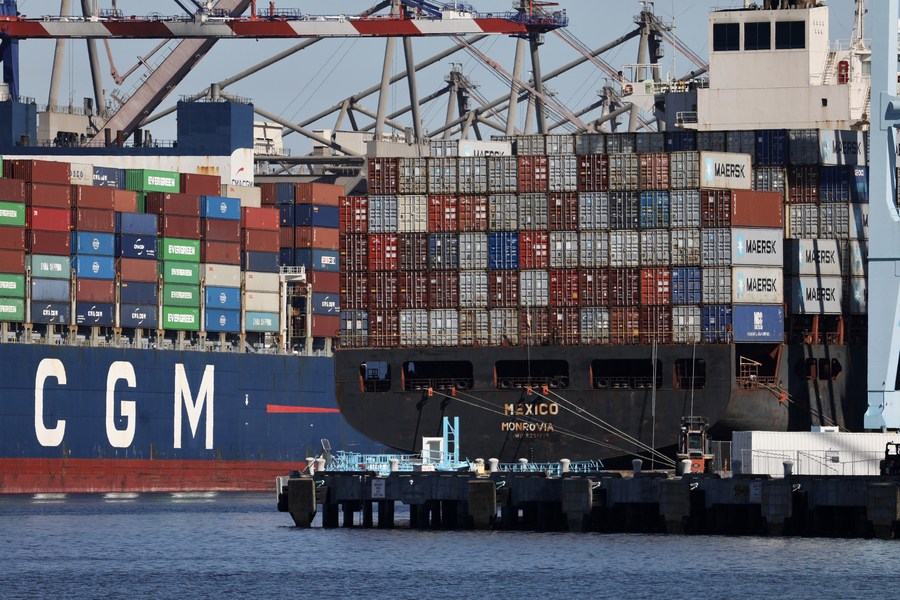More US tariff exclusions for China urged
By Zhao Huanxin in Washingtonand Zhong Nan in Beijing | chinadaily.com.cn | Updated: 2023-09-07 23:34

Trade: Lifting tariffs likely to lower costs for US companies
As the United States on Wednesday further extended tariff exclusions on some imports from China until the end of 2023, the Chinese embassy and analysts said that all the remaining additional duties should be removed altogether.
The Office of the United States Trade Representative, or USTR, announced the further extension of "Section 301" tariff exclusions on 352 imports from China and 77 COVID-19-related categories that were set to expire on Sept 30.
The extension until Dec 31 will "allow for further consideration under the statutory four-year review", the office said in a statement.
Liu Pengyu, a spokesman for the Chinese embassy in the US, said that China has always believed that the unilateral tariff increases by the US are not good for China, the US and the world.
"As inflation continues to rise and the global economic recovery faces challenges, we hope that the US will, in the fundamental interests of consumers and producers in both countries, remove all the tariffs on China as soon as possible, and take bilateral trade relations back to the normal track at an early date," Liu told China Daily.
Chinese Foreign Ministry spokeswoman Mao Ning told a media briefing on Thursday that as a matter of principle, China consistently opposes engaging in a "tariff war".
"We believe that in a 'tariff war' there are no winners," Mao said.
Unilateral tariffs imposed by the US on China are detrimental to the two countries and the world, she added.
This is the third time that the 352 exclusions have been extended out of 549 exclusions that expired at the end of 2020, meaning that the practice of granting tariff exclusions to selected industries has been in effect through the administrations of former president Donald Trump and President Joe Biden.
The Trump administration, invoking Section 301 of the Trade Act of 1974, first launched the China tariffs in 2018. The tariffs remain in place under the Biden administration.
John G. Murphy, senior vice-president for international policy at the US Chamber of Commerce, noted that in 2018-19, the USTR imposed Section 301 tariffs on about 10,000 categories of goods from China.
"Today it is extending those exclusions through the end of the year, but the great bulk of the tariffs remain," Murphy said on social media.
Inu Manak, a fellow for trade policy at the Council on Foreign Relations, said the announcement was good news, but Washington needs to take further steps.
"The next step is to permanently remove Section 301 tariffs at the end of the review period and put an end to this failed trade war," Manak wrote on social media on Wednesday.
The US currently imposes a 25 percent tariff on approximately $250 billion of imports from China and a 7.5 percent tariff on approximately $112 billion worth.
On Tuesday, US Commerce Secretary Gina Raimondo, a member of Biden's Cabinet, said she does not expect any revisions to the China tariffs until an ongoing review is completed by the USTR office.
Removing the tariffs would increase the competitiveness of US companies by lowering their costs, and in turn spur additional economic output and growth by the US goods-producing sector, according to trade analysts Tom Lee and Tori Smith, whose research published in January found that US consumers largely bore the brunt of the tariffs, paying a total of $48 billion.
The additional tariffs on Chinese imports have been a sore point in China-US relations, which both sides have sought to stabilize over the past few months.
In a meeting with Raimondo in Beijing late last month, Chinese Vice-Premier He Lifeng expressed the country's concerns over measures taken by the US, including Section 301 tariffs and export and investment restrictions.
Chinese Ambassador to the US Xie Feng noted in a speech at the US-China Business Forum on Aug 29 that the sharp decline — 14.5 percent — in China-US trade in the first half of the year is partly a result of the Section 301 tariffs.
The envoy also noted that average US tariffs on Chinese products are at 19 percent, while China's tariffs on American goods are 7.3 percent on average.
Wei Zongyou, a professor at the Center for American Studies at Fudan University, warned that even though Washington recently emphasized the need to shore up high-level exchanges between China and the US to better manage differences and seek cooperation, the attempts by the Biden administration to strike a balance between competition, confrontation and cooperation remain unchanged.
























